Hickory Flooring Pros and Cons
March 23, 2023 | By Bruce Product Expert
Hardwood flooring continues to be a favorite among homeowners. It offers striking looks, timelessness, and durability. Plus, it typically increases your home’s value.
Among the types of hardwood flooring, hickory has become increasingly popular. It’s renowned for its durability and unique personality. But, like any option, hickory flooring has its pros and cons. We’ll give you some closer insights to help you decide if hickory flooring suits you.
Some Insight into Hickory
Hickory is a common domestic species across the United States. There are some 12 species of hickory in the U.S. alone. Its heartwood tends to be light to medium brown with a reddish hue. The sapwood is paler brown.
Hickory is one of the densest and strongest American hardwoods. So it’s one tough cookie when used for flooring. Most American hardwoods feature a Janka rating in the 1,800 to 1,900 range. In case you aren’t aware, that rating determines the resistance of wood to denting and wear.
Hickory is the hardest commercially available hardwood, with a rating of 1,820. Compare that to maple at 1,450 and white oak at 1,360. For some perspective, people often think of cherry as a hardwood, but its rating is 950. Poplar is just 540.
So here’s the first thing to understand about hickory. It produces one of the hardest wood floors available, at least domestically.
Hickory Flooring Pros
When you begin to look at hickory flooring pros, durability stands out. The high Janka rating translates into flooring that can take a good bit of punishment. So if you have high foot traffic, especially several kids and maybe some pets, hickory is up for the challenge.
It can handle hallways, living rooms, entryways, and kitchens better than most other hardwoods, certainly domestic hardwoods. Many homeowners worry about their hardwoods getting wrecked by traffic. Hickory reduces a lot of that worry.
Like all hardwoods, perhaps even more so, hickory solid wood flooring will last for decades. That’s especially true, considering you can sand and refinish hardwood floors multiple times. Hickory flooring also requires little maintenance.
Some of its durability translates into better water resistance than other hardwoods. It will perform better in challenging climates than many other hardwoods.
That said, hardwoods are inherently prone to water damage. So you’ll need to shift to engineered hardwood flooring for truly water-resistant or even waterproof hardwoods.
Hickory Engineered Flooring
Engineered wood flooring features a plywood core. That core adds stability to planks. As a result, they’re less prone to expand and contract when exposed to moisture. The top layer uses a hardwood veneer, so distinguishing engineered from solid wood flooring is nearly impossible.
Engineered floors come pre-finished. That makes installation easy while providing increased scratch resistance.
For instance, Bruce® offers Hydropel™ waterproof engineered hardwood flooring in hickory and white oak. So you can get the benefits of hickory with the added advantage of waterproofing.
Hickory Brightens any Room
Hickory flooring owns a distinctive appearance. Its wood grain patterns can vary from wavy to straight. And its color can range from pale yellow to reddish-brown.
It also includes beads and knots, which stand out against the lighter wood. These imbue hickory hardwood flooring with tons of character. Compared to oak or maple solid hardwood flooring, hickory demonstrates a unique personality.
Indeed, people often consider hickory flooring busy due to its spirals, notches, and waves. But for others, it creates distinctive looks in hardwood, surpassing other domestic hardwoods.
Frequently, manufacturers use hickory for wide plank flooring. The broader planks do an excellent job absorbing some of the flooring’s busyness. They also combine to give hickory flooring a quintessential rustic look, especially when hand-scraped.
Hickory Takes Stains and Finishes Incredibly Well
If you aren’t comfortable with hickory’s natural colors, don’t worry. You can choose whatever hue you like. Hickory accepts stains and finishes incredibly well. As a result, you can get the best of both worlds.
You can get hickory’s intricate patterns and character but in the color scheme of your choice. For example, Bruce offers over 50 shades of solid and engineered hickory flooring.
What are Some Cons of Hickory Flooring?
Okay, no flooring is perfect, regardless of how many pros it has. And that applies to hickory flooring.
As mentioned, hickory flooring has a unique look thanks to its grain patterns and markings. Not surprisingly, some people fall in love with that level of character. And not surprisingly, some people get turned off. Like any flooring, you must decide what fits your tastes and design style.
Hickory may not be appealing if you prefer narrow-width planks. Instead, it’s best, or at least most often, used as wider-plank hardwood flooring.
Hickory Can Cost More Than Other Hardwoods
Why? Although hickory is a typical domestic hardwood, fewer trees exist than oak or maple. So it comes down to supply and demand. There are more oak and maple trees, so the cost per square foot of those flooring options is less than hickory.
However, that doesn’t mean hickory flooring is out of reach.
Many people turn to exotic hardwoods, like Mahogany, Tigerwood, or Rosewood, to capture a specific look. Compared to those, hickory can deliver a captivating look for substantially less.
By the way, hickory, like most domestic hardwoods, is considered sustainable flooring. However, there are fewer hickory trees than other domestic options. That makes it less of a sustainable option than other hardwoods.
Hickory is Less DIY-Friendly
That same hardness that makes hickory flooring so durable can make it more difficult for DIY installers. It’s difficult to cut and sand. If you want to install the flooring yourself to reduce costs, there may be better options than hickory. Typically, professional installation is your best bet for hickory flooring.
With professional installation, you can avoid issues down the road.
For example, hickory floors can warp. A professional installer knows to acclimate wood flooring before installation. And that alleviates warping issues. They’ll also be more familiar with how to work the wood to avoid problems.
Is Hickory Flooring Right for You?
Putting hickory flooring on your hardwood shopping list is a good idea. It offers distinctive wider planks, incredible durability, and a variety of colors. Plus, it has one-of-a-kind looks.
Especially among domestic hardwoods, you won’t find flooring with more personality that will have people commenting about your floors.
But if you’re less bold and budget-conscious with your design style, you may quickly cross hickory flooring off your list.
Ultimately, flooring is a personal decision. And your tastes are all that matter. Nonetheless, give yourself the benefit of checking out hickory flooring options before you decide.
Bruce has a hardwood flooring visualizer. So you can select a hickory flooring option that appeals to you and see it in your room.
Just take a picture of your room using your phone and upload it. The visualizer will do the rest. You’ll see firsthand whether the hickory flooring you selected fits your style.
And if it does, use our dealer locater to find the nearest retailer.

Ready to shop for hickory flooring near you?
Use our retail locator to find where you can buy Bruce oak flooring.
Find a Store
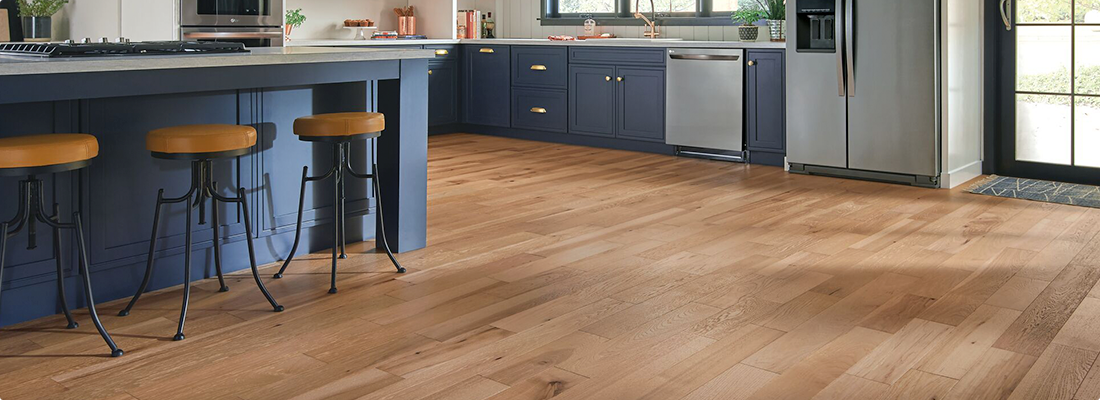
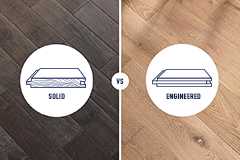 Solid vs Engineered Hardwood Flooring
Solid vs Engineered Hardwood Flooring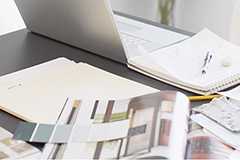 Guide To Choosing a Hardwood Floor
Guide To Choosing a Hardwood Floor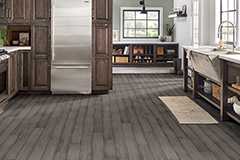 Hardwood Flooring Room Inspiration Guide
Hardwood Flooring Room Inspiration Guide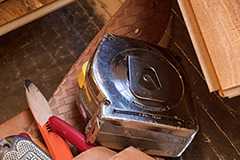 10 Things to Know About Hardwood Floor Installation
10 Things to Know About Hardwood Floor Installation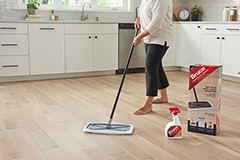 How To Clean and Protect Hardwood Flooring
How To Clean and Protect Hardwood Flooring